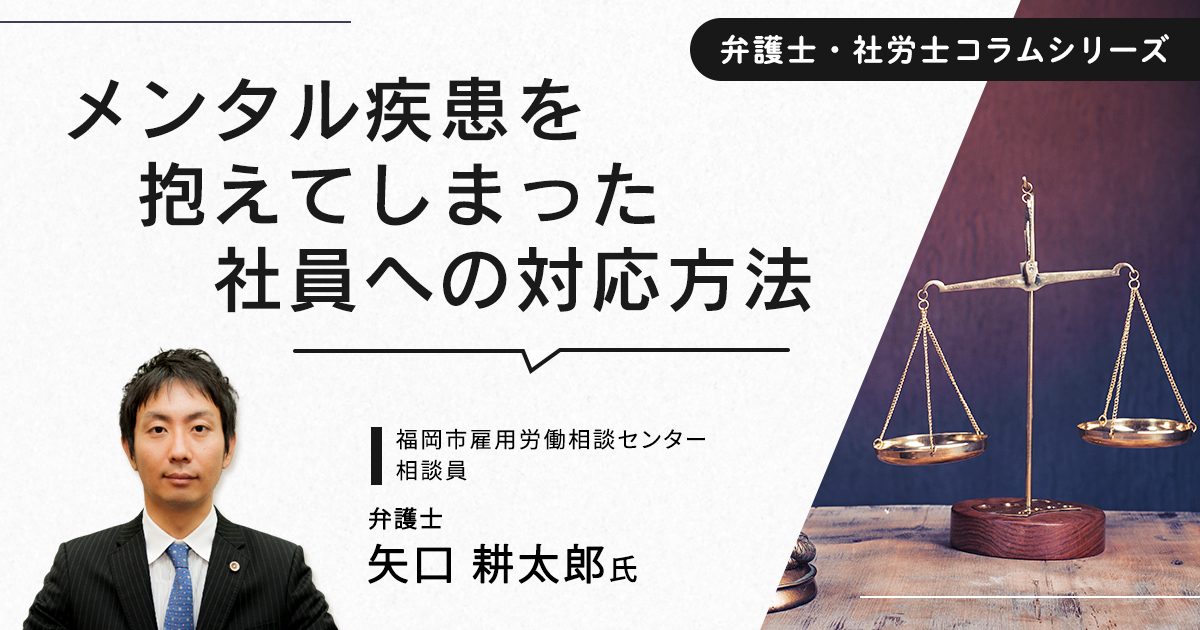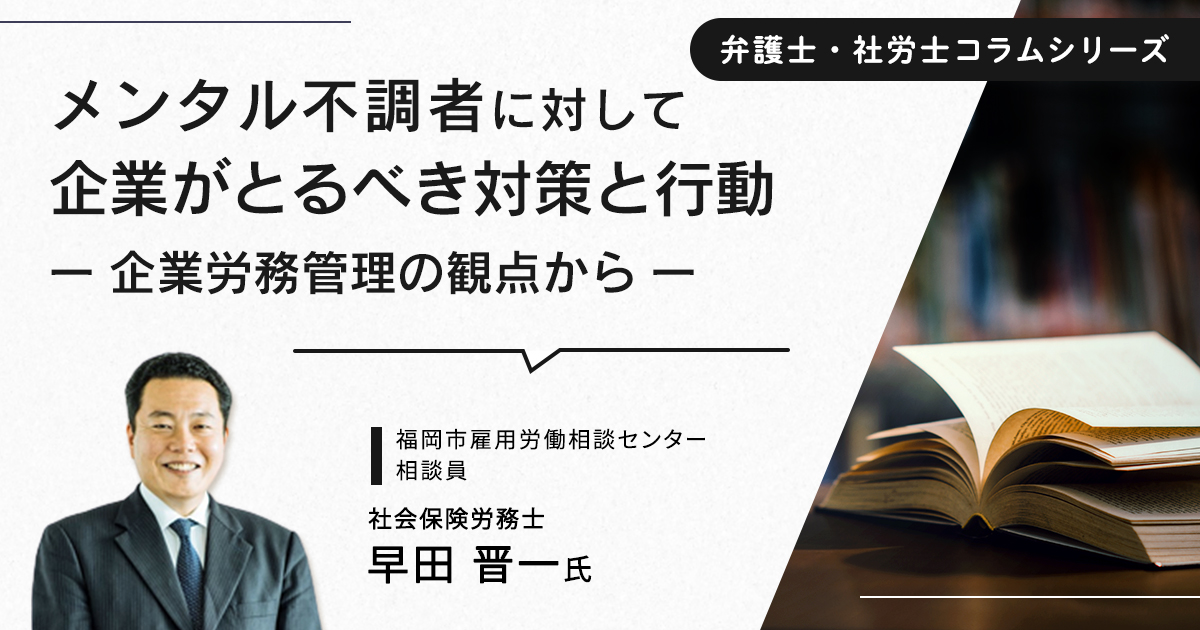Hello! I'm Kotaro Yaguchi, a lawyer for FECC counselors! Today's theme is "mental health".
Let's think together about what kind of response to employees who have actually had mental disorders, referring to actual legends, etc.
1. Let's think about it in the case
In April 2019, President A of Startup Co., Ltd. decided to hire a new engineer, Mr. Y.
The terms of employment are as
Working hours
8:30 a.m. to 5:30 p.m. (break time is from 12:00 p.m. to 1:00 p.m. 8-hour work. Closed on Saturdays, Sundays, and holidays)
Basic salary
Monthly salary 200,000 yen + fixed overtime fee 50,000 yen (however, 34 hours of overtime, if exceeded, pay separately)
be.
Mr. Y was very serious and good at programming. I was communicating with the people around me.
In August 2020, Mr. Y suddenly said under A, "I have a consultation."
When I asked him what he was doing, he said, "C is harassing me. Even when I was being asked for social distance because of the coronal disaster, I suddenly came near me and shouted, banged on the door of the house when I was sleeping at home, and during this time came into the house. It's already the limit."
A is surprised, and when the situation is asked to C, it is said that it does not say out loud near Mr. Y, and it has not been going to Mr. Y's house. A wondered and told Mr. Y, but Mr. Y was not convinced.
A month later, Mr. Y came to consult with A again.
"In addition to C, D also comes together to harass me. He always asks me to take a mask in front of me and say, "Kill, kill, kill." I can't stand it anymore! You can't go to work at the company as it is! Do something about it! It was.
Mr. A was surprised and spoke to C and D, a nearby employee, but such a fact was not admitted.
Eventually, Mr. Y always felt nervous in his eyes, and he was wary of the surroundings, and one day he said to Mr. A, "I can't come to work ane!" I have said unilaterally. A thought that this was a schizophrenia while the appearance of Mr. Y was obviously strange, and examining it.
Mr. Y stopped coming to the company from the next day.
It was thought that A was not able to leave this because of mr. Y's action, and it was made to be "Dismissal" for the reason of "Absenteeism without permission" alever there was a rule of the private wound sick leave in the employment rule because of Y's action, too.
A month later, Y's lawyers filed a lawsuit seeking to invalidate the dismissal and to pay his salary from the day he was fired. 」
How was it?
Mr. Y often causes confusion in the company, but president A is not "schizophrenia"? It is like doubting.
2. What is schizophrenia?
What kind of illness is it when thinking about mental illness? It is also important to know that.
Schizophrenia is a disease in which the nervous system, including the brain, is impaired by transmitting various stimuli.
There are some unknown parts, but it is said that troubles have occurred in the nervous system that governs tension and relaxation, the series related to motivation and its periness, and some series related to information processing and cognition. And this is not a special disease, it is a disease that is said to have taken about one in 100 people.
When schizophrenia occurs, hallucinations and delusions are seen as typical symptoms, and symptoms such as always feeling anxious and nervous, nervous, or not feeling what you want to say may be seen.
3. Let's look at each other's claims
By the way, President A of Startup Co., Ltd. "dismissed" Mr. Y who no longer come to the company because of "absenteeism without permission". Was this decision correct?
In fact, there has been a trial from Mr. Y's lawyer for invalid dismissal and the day of dismissal, so let's look at each other's claims.

4. Which is correct?
First, let's consider how "dismissal" is prescribed by law.
Originally, the Civil Law states that if you have not decided on a period of time for an employment contract, you are free to dismiss each party as "each party may apply for termination at any time."
However, the salary received from the company is directly linked to the lives of employees. If you are suddenly laid off and your salary disappears, the cost of living may disappear and even the lives of employees and family members may be threatened.
Therefore, in Japan, there was originally a case law called "law of abuse of the right to dismissal" that could not be easily dismissed, but now it is not possible to dismiss easily under the law called the "Labor Contract Law".
Article 16 of the Labor Contract Act
It is stipulated.
Dismissal is invalid if there is an objectively reasonable reason and it cannot be said that it is appropriate for socially well-being. Article 16 of the Labor Contract Act greatly constrains the dismissal of a company.
Is the dismissal of this case equivalent to socially well-being for objectively reasonable reasons?
Startup Co., Ltd. is dismissed for "absenteeism without permission".
"Absenteeism without permission" generally greatly destroys trust relationships, damage to the company is large, and according to the rules of employment, "absenteeism without permission" is mostly a reason for dismissal.
Then, if absenteeism without permission is true, it seems that dismissal is likely to be effective as "there is an objectively reasonable reason".
However, in this case, there is a situation that the company also suspected a mental disorder.
Will the dismissal still work?
The concepts of Article 16 of the Labor Contract Act, such as "objectively reasonable reasons" or "socially reasonable" concepts, are very abstract. It looks like any judgment is possible.
In these cases, consider similar cases.
Looking at the ruling issued by the Tokyo High Court on January 16, 2011,
"If a mental disorder is suspected, it is thought that it will encourage the person or family members or employees to take a leave of absence until they recover from their mental disorders and to work through the Environmental, Health and Safety (EHS) department(EHS), and if there is no mental disorder, if they continue absenteeism for a long time, It is recognized that absenteeism would not have continued if we had taken actions such as notifying of any benefits such as absenteeism and being subject to disciplinary action under the rules of employment."
(Tokyo High Court, January 26, 2011, Japan Hewlett-Packard Case)
And the dismissal was invalidated as there was no objectively reasonable reason, as it should have prompted me to take leave of absence from the 10th year before dismissal.
Let's look at this case in this case.
Even in this case, the company suspected a mental disorder, but it was more likely that it was actually a mental disease.
And, it dismissed it on the reason of "Absenteeism without permission" without prompting the private wound sick leave etc. provided for in the employment rule nevertheless.
The point is the same as the court case.
If you do that, there is a high possibility that it will be invalidated because there is no objectively reasonable reason for dismissal.

5. What should I do?
If the dismissal is invalidated, the company will have to pay the employee the full salary from the time they are fired until the verdict is issued.
The amount can exceed 10 million yen, and this alone is very damaging for small and medium-sized enterprises.
What should I have done?
From the trial case,
- With regard to mental disorders, it was necessary to understand that the user also had an obligation to consider the mental health of employees. It was urged of the medical examination, and the return to work from the leave of absence by the leave order should have been examined.
- As for "dismissal", "Can't you take any other way than dismissal?" so as not to be unfair dismissal that lacks rational reason? It is always to think.
You can read that. Startups, Inc. should have taken measures to encourage the recovery of Y's schizophrenia by taking a leave of absence from work because of illness, not dismissal.
6. Finally
Mental illness is characterized by the fact that, unlike injuries and ordinary illnesses, it is often not undersiable from the outside.
It is difficult to gain understanding from the people around you, and troubles are also likely to occur. Therefore, there is a part that is easy to mis-respond because of inse understanding.
When responding, let's hold down the following points.
- Are your employees mentally diseased? If you suspect, what kind of disease is it? Make an effort to know that properly.
- Understand that dismissal cannot be easily under Section 16 of the Labor Contract Act.
Once the dismissal is invalid, the employee must be returned and paid between the dismissal and the verdict. - If you suspect a mental disorder, consider pushing for a return to work or taking a leave of absence until you recover from a mental disorder.
Fecc to consult on how to deal with employees who have mental illnesses
FECC helps hr and management solve labor and legal questions. It is also possible to consult with lawyers and company workers free of charge about the handling of employees who have mental disorders, such as leave of absence or dismissal. Please feel free to contact us!
Related article
The essence of mental health prevention and response that changes in corona
Mental health professionals who are industrial physicians and psychiatrists but also serve as directors of startup companies will tell you how to prevent mental disorders and tips for early detection of mental disorders.
Related article
メンタル不調者に対して企業がとるべき対策と行動 - 企業の労務管理の視点から -
For corporate labor management, dealing with mental health disorders in the workplace is an important issue that cannot be avoided. We will explain from the perspective of a social insurance labor consultant who is a labor professional, about measures to prevent mental health problems and the creation of rules when problems occur.

 Consult and make a reservation
Consult and make a reservation Add LINE Friends
Add LINE Friends 080-1001-4675
080-1001-4675





 Receive on FaceBook
Receive on FaceBook Receive on LINE
Receive on LINE
